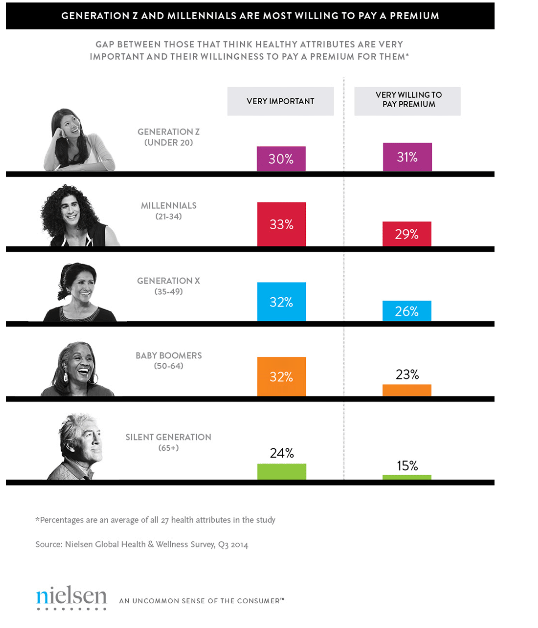 Despite our best intentions to eat healthily, the contents of our shopping carts don’t always align with our objectives. To better understand what’s driving consumption trends, we asked online survey respondents in 60 countries to rate the importance of 27 different health attributes for the foods they buy. We found that while roughly one-third of all respondents consider any health attribute “very important,” sentiment varied by age—and the findings may not be what you’d expect.
Despite our best intentions to eat healthily, the contents of our shopping carts don’t always align with our objectives. To better understand what’s driving consumption trends, we asked online survey respondents in 60 countries to rate the importance of 27 different health attributes for the foods they buy. We found that while roughly one-third of all respondents consider any health attribute “very important,” sentiment varied by age—and the findings may not be what you’d expect.
For example, respondents from the Silent Generation (aged 65+) don’t place as much emphasis on health attributes when they make purchases as other groups do. In fact, despite their advanced age and increased proclivity toward health issues, the oldest generation has the least amount of respondents who consider health attributes very important in their purchase decisions. Health attribute ratings are highest among Millennials (21-34), followed by Baby Boomers (50-64), Generation x (35-49) and Generation Z (under 20).

Certain specific attributes, however, emerge as more important to younger generations, while others tend to resonate with older consumers. Forty-percent of Generation Z respondents say ingredients sourced sustainably are very important in their purchase decisions, followed by Millennials (38%) and Generation X (34%) respondents, compared with only 21% of the Silent Generation. Conversely, sugar-free and low-sugar products are more important to older consumers. Thirty-seven percent of Baby Boomers and 33% of Silent Generation respondents say these attributes are very important, compared with 26% of Generation Z and 31% of Millennials.
To find the deepest level of commitment to healthy foods, however, you need to look where people are willing to put their money where their mouths are. The survey showed that a willingness to pay a premium for health attributes declines with age as well. Generation Z and Millennials are more willing to pay a premium for all attributes in the survey, even those that are more important to Generation X and Baby Boomers.
The generation gap is particularly pronounced for functional foods that reduce disease risk or promote good health and for socially/environmentally responsible foods. For example, 41% of Generation Z and 32% of Millennial respondents are very willing to pay a premium for sustainably sourced ingredients, compared with 21% of Baby Boomer and 16% of Silent Generation respondents. Generation Z and Millennials are also leaders in the gluten-free movement. Thirty-seven percent of Generation Z respondents and 31% of Millennials are very willing to pay a premium for gluten-free products, while only 22% of Baby Boomer and 12% of Silent Generation respondents are willing to do so.
“While age often dictates a need for foods that contain certain health attributes, it is the youngest consumers who are most willing to back up their sentiments with their wallets,” said Susan Dunn, executive vice president, Global Professional Services, Nielsen. “As Millennials’ purchasing power increases, manufacturers and retailers that make the effort to understand and connect with the needs of this generation can increase their odds of success.”

